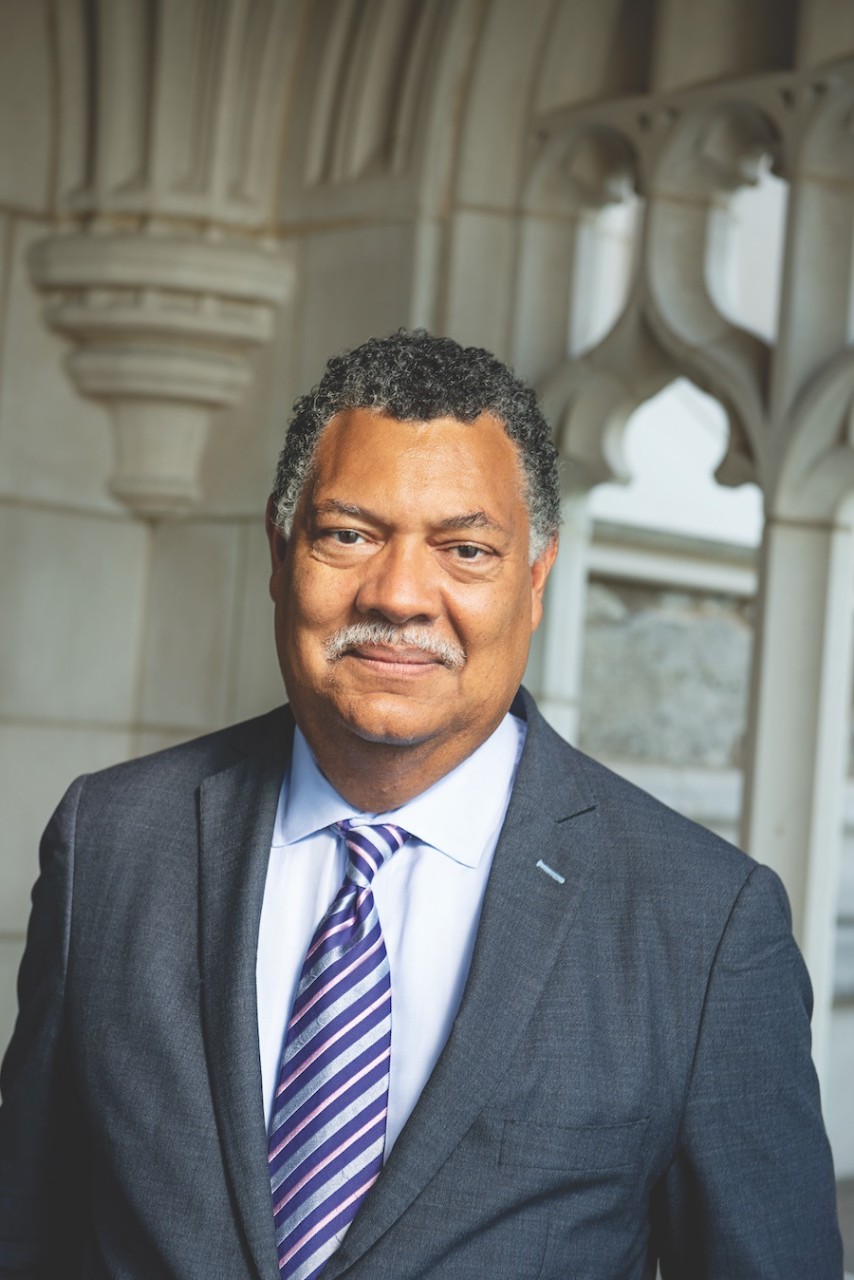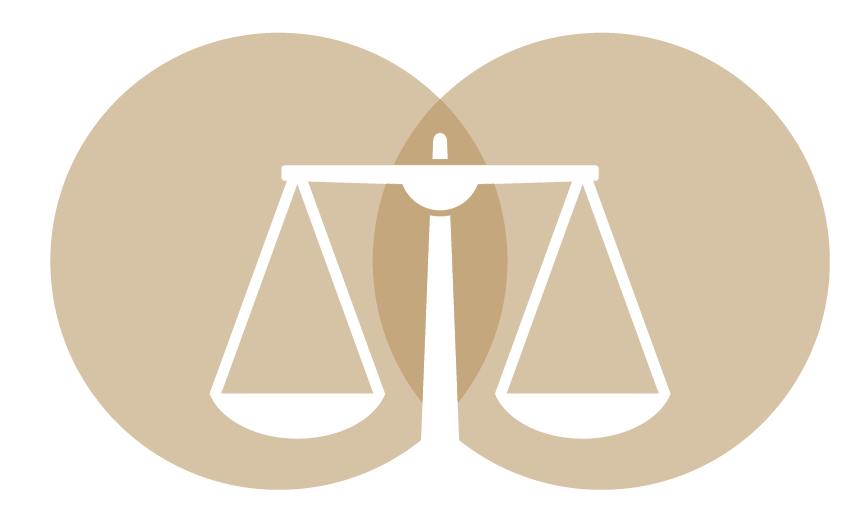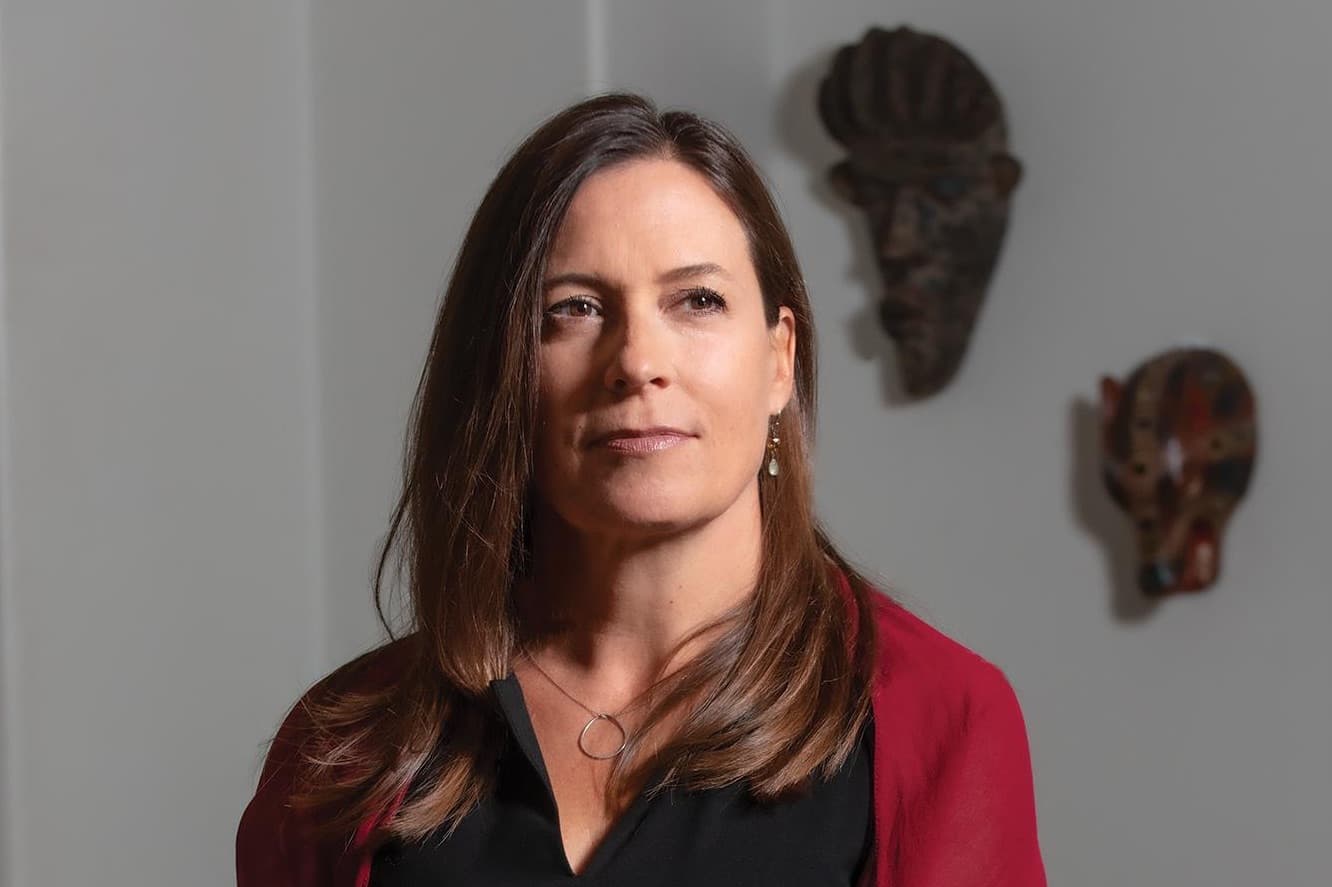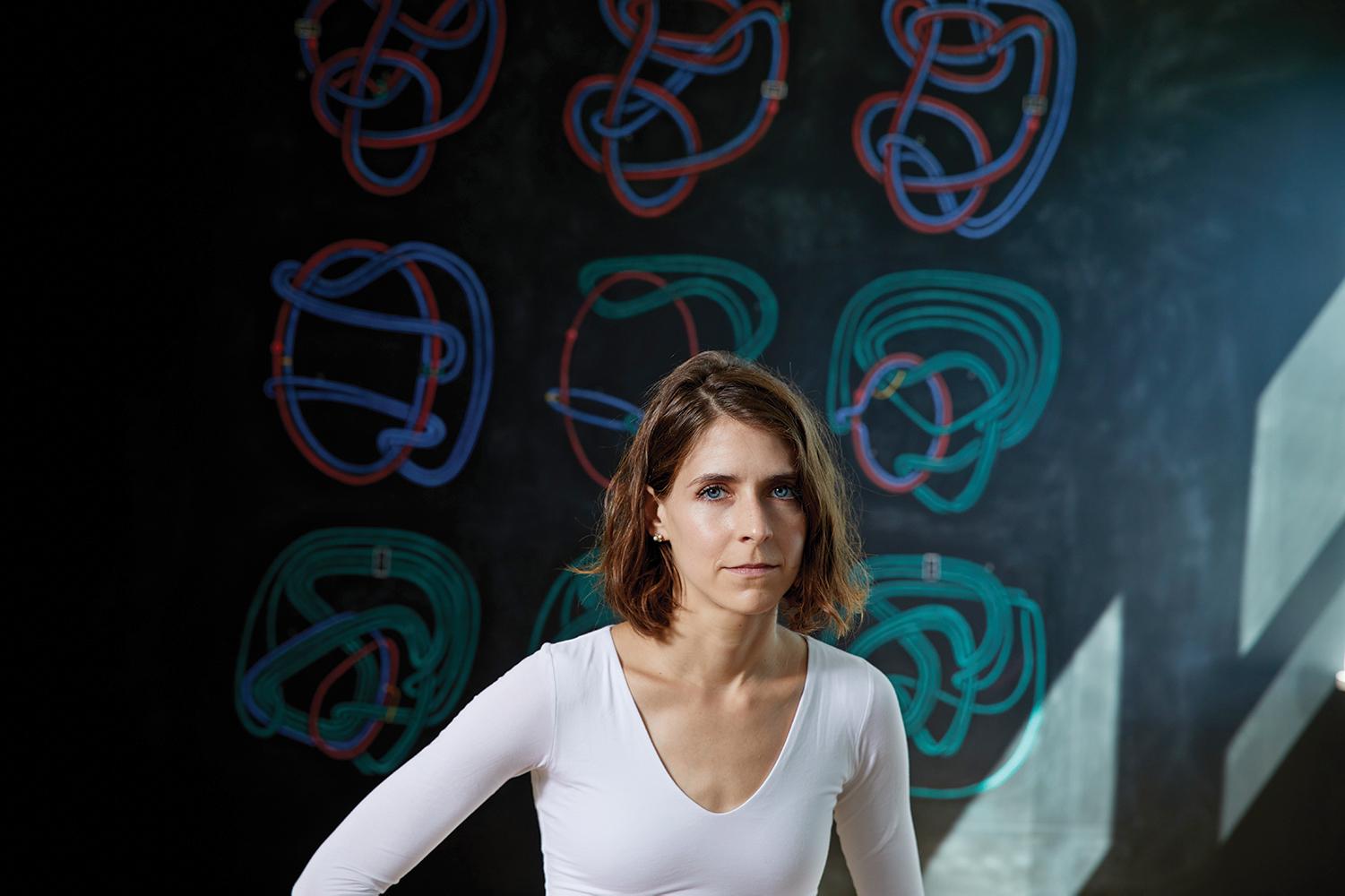
Vincent Rougeau.
Photos: Webb Chappell
A Time For Change
It was difficult, over the summer, not to conclude that the nation had reached a new moment of reckoning with the role that systemic racism has played in this country since its founding. Outrage over the killing of George Floyd by a police officer in Minneapolis set off a wave of protests that began as a call for reform of the criminal justice system and has steadily evolved into a sweeping critique of the racist underpinnings of our country’s structures and institutions.
Against this backdrop, BC recently announced the launch of the Boston College Forum on Racial Justice in America. In an extraordinary letter this summer, BC President William P. Leahy, SJ, announced the new initiative, writing that “The current anger, division, and alienation result from long-term, systemic causes, and they call for resolution of underlying issues through immediate and sustained action. To move forward, it is essential for everyone to acknowledge and affirm that Black Lives Matter.”
The new project represents the University’s belief that it must be part of the solution to the “generational harm that racism has imposed on Black people in this country,” Law School Dean Vincent Rougeau, who will serve as the Forum’s inaugural director, told me during a recent discussion. We spoke at length about the initiative, how BC can contribute to the effort to eradicate racism, and Rougeau’s own experiences as a Black American. The following conversation has been lightly edited for clarity and length.
“ A lot of things that we thought were going to happen simply by passing laws haven’t happened. So it’s not simply about legislation. It’s about unpacking our culture and reevaluating how we understand our obligations to one another in order to be the kind of nation that we say we are. ”
John Wolfson: You’ve described this new project as a place where BC will demonstrate its commitment to racial justice. How will it do that?
Vincent Rougeau: To start, we have set up a steering committee of people from across the University—students, faculty, staff—and we have agreed that we must start by looking at ourselves. I want the Forum to be a place of dialogue, nationally and beyond, and I want to see BC become an academic leader in this endeavor. But before we get there, we’ve got some housekeeping to do. The question we have to answer is, How do we become a community that is truly committed to the work of being anti-racist, of ridding ourselves of racism? At our launch event in early October, we’ll begin with a liturgy of lamentation and hope. Fr. Leahy will open the liturgy in some way, and we’re working on it with the School of Theology and Ministry because we think it’s important for BC, as a Jesuit Catholic university, to recognize this as a moral issue. That’s going to be followed by an academic panel that I’ll moderate in which we’ll have Black scholars from BC talking about how their experiences here have shaped their perspectives on race and racial justice. We have some other events planned for the month of October, including some “Courageous Conversations” on racial justice and democratic citizenship, and a student-led event.
JW: What kind of work can we expect to see coming out of the Forum in the years ahead?
VR: We’re looking at a number of ideas, and we already have a few programs planned. The Schiller Institute wants to do a program on environmental racism. The School of Education wants to think more deeply about how you direct students of color into Ph.D. programs and support them so that they can come out and be faculty members. All across the University, we want to explore whether we’re missing opportunities to push for racial justice in the work that we do as scholars and teachers. How do we reach out to first-generation students, many of whom are students of color, and not only admit them, but make them feel welcomed and engaged as meaningful participants in this community? Those are the kinds of things that I hope the Forum will support across the entire institution. I also believe it can become a model for how universities collaborate with their local communities in racial justice work, and that could become a way that we start to engage on the national stage. I think we’ll have significant scholarly research to contribute.
JW: You’ve said that BC is uniquely suited to this kind of project.
VR: We are a Catholic university. We have access to a moral tradition and our own church’s teachings that racism is a sin—it is fundamentally counter to everything that Christianity purports to value. For BC to not give full-throated support to the notion that racism is wrong would basically counter our own values and mission. And so we are giving it that support. Fr. Leahy and the Board of Trustees are to be commended for their leadership and for recognizing the moment and how critical it is for Boston College to be moving in the right direction.
JW: Why is something like the Forum needed in the first place?
VR: This is about more than just what we believe here at BC. It’s about where we are as a nation. No one feels comfortable acknowledging that institutions, people, or countries they love may be deeply flawed in some way. And identifying that flaw and working on it directly can be painful. But that’s the first step. It’s like someone you love who has alcoholism. Everyone has to come to terms with the fact that the person is an alcoholic. Then you can start trying to work on the problem. It’s the same with racism and structural racism. The fact that we’re all now willing to identify it and speak to it is the important first step.
JW: It really is pervasive. You, for instance, are the dean of a highly regarded law school, successful by any measure, and yet you and your family are well acquainted with not just the kind of racism that’s experienced on the personal level, but the kind that permeates the structures and institutions of our society.
VR: I used to talk to my students about how their grandfathers came back from World War II, walked into a bank, got a VA loan, and bought a house. Then that house went up in value and they were able to buy a nicer one in a better neighborhood. Their kids then grew up in that house, and were later able to buy a house of their own in an even better neighborhood. Meanwhile, my grandfather was forced to stay in the segregated Black neighborhood in the town where he raised my father. He couldn’t go to the bank and get a loan because they wouldn’t give him one, or if they did, he was going to have to buy in a neighborhood that was never going to increase in value. So it makes no sense to then say to me or to my father, “Why haven’t you bought a house by now? Why don’t you have money for a down payment?” In my family’s case, we were eventually able to do those things, but no one ever stops to consider that it took two, three, four times as much effort to do the very same thing that for other people it was almost handed to them. White veterans were invited to come in and get loans that Black veterans were denied. Many white people have no idea this is true, and that’s just one example of generational racism that has limited the ability of Black people to accumulate wealth in our country. Part of our role as a university is making sure that more people understand the basic historical reality.
JW: That gets back to something you were saying earlier, that we can’t actually become a more perfect union until we acknowledge uncomfortable truths about our country.

VR: The best example of that is how Germany has dealt with the Holocaust. Those of us old enough to remember know that there were decades when you just didn’t talk about it with Germans. But over time, they’ve acknowledged it and they’re now working in their country to attempt to atone for it. There are powerful monuments to victims of Nazi terror all over Germany. Yet, we have monuments to Confederate soldiers and generals in public spaces all over this country that are only now coming down.
JW: There have been times in relatively recent American history when it’s seemed as though we were about to make that pivot and begin our own process of atonement. Yet, decades later, it continues to elude us.
VR: Laws were passed, and we had lots of concrete expressions of the fact that, “Yes, racism is wrong!” We passed the Voting Rights Act. We passed the Civil Rights Act. And I think people felt, “Okay, that work is done and now we can get on with living out these values that we claim to embrace.” But a lot of things that we thought were going to happen simply by passing laws haven’t happened. Black families continue to have a very difficult time accumulating wealth, and we can all see what’s going on with policing and with healthcare disparities. So we see that there’s a deeper problem—a structural problem—that needs to be addressed. It’s not simply about legislation. It’s about unpacking our culture and reevaluating how we understand our obligations to one another in order to be the kind of nation that we say we are.
JW: Yet, Black Americans are often cast not as the victims of a structural racism that has constrained their ability to thrive in this country but as being responsible for their own struggles.
VR: Americans need to reckon with the truth that we have created a racial binary in this country—white good, Black bad—and it has had extraordinarily damaging effects, and it’s led to this blaming of the victim. Why don’t those people work harder? Why can’t those people be smarter? I can do it, why can’t they? It lacks any accounting whatsoever of the multigenerational attempt to keep Black people in a place of subordination and oppression.
JW: You made the point that a more developed educational experience is one way to begin that accounting. With that in mind, do you anticipate the Forum helping to lead changes at the curriculum level here at BC?
VR: I hope that the Forum can be a vehicle to support departments and schools in their efforts to enrich and expand and deepen their curriculum and to open it up to a much more realistic and unvarnished exploration of the truth—getting to the root of some of the distortions that all of us have been fed about our own history and about what this country has or has not achieved for all of its citizens. We’re certainly beginning that process in the law school, and I know many other departments and schools are doing it, too. As a place of higher learning, that should be something that excites us.
JW: You seem to have, quite literally, been born to do this kind of work.
VR: My birth at a segregated Catholic hospital in Miami Beach, Florida, had to be an act of civil rights agitation on my mother’s part. My mother, a Catholic woman, worked as a professional at a Jewish hospital in Miami Beach. She knew that having her baby at the Catholic hospital was going to stir up trouble, and she could have chosen to have me at the hospital where she worked instead. It’s hard enough to have a baby, your first baby, but she felt a duty and an obligation to push the institution to do what was right. That was the beginning of my life fifty-seven years ago. I was one Black person in society and one Black person who’s had a lot of fortunate interventions in my life to allow me to be where I am today, but just imagine if we could truly release the potential of the African-American community in this country by making a commitment as a society to rid ourselves of racism and to work constantly to open up all of our institutions and opportunities to everyone.


 print
print mail
mail

